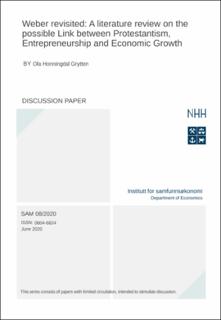| dc.contributor.author | Grytten, Ola Honningdal | |
| dc.date.accessioned | 2020-06-09T07:16:00Z | |
| dc.date.available | 2020-06-09T07:16:00Z | |
| dc.date.issued | 2020-06 | |
| dc.identifier.issn | 0804-6824 | |
| dc.identifier.uri | https://hdl.handle.net/11250/2657268 | |
| dc.description.abstract | The present paper looks at the Weber-Tawney thesis on the positive link between Protestant ethic and economic growth. Both scholars observed that Protestant areas in the Western world seemed to gain faster and more wealth than areas with less Protestants, and largely explained this by a special mentality fostering entrepreneurship in Protestant thinking.
By conducting a literature study of research in the area, the paper concludes that despite wide debate, there is a significant acceptance that there is a statistical link between religious affiliation and growth.
However, scholars tend to disagree on the causal relationships. Still, the bulk of the literature seems to agree that the Reformation paved way for entrepreneurship and economic growth in one way or another. The paper seeks to map the most important explanations and the arguments behind them. | en_US |
| dc.publisher | Institutt for samfunnsøkonomi | en_US |
| dc.relation.ispartofseries | DP SAM;08/2020 | |
| dc.subject | Weber, Reformation, Protestantism, Entrepreneurship, Economic Growth | en_US |
| dc.title | Weber revisited: A literature review on the possible Link between Protestantism, Entrepreneurship and Economic Growth | en_US |
| dc.type | Working paper | en_US |
| dc.subject.nsi | Samfunnsvitenskap | en_US |
| dc.source.pagenumber | 19 | en_US |
